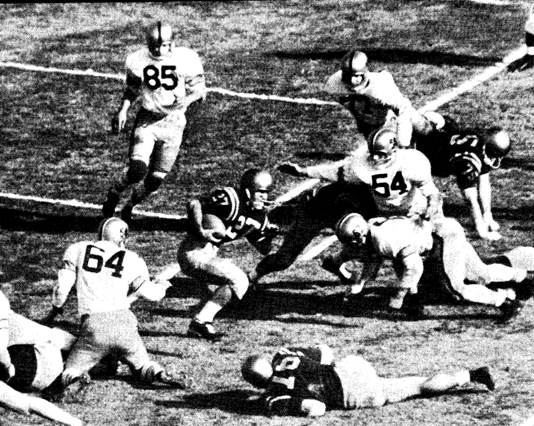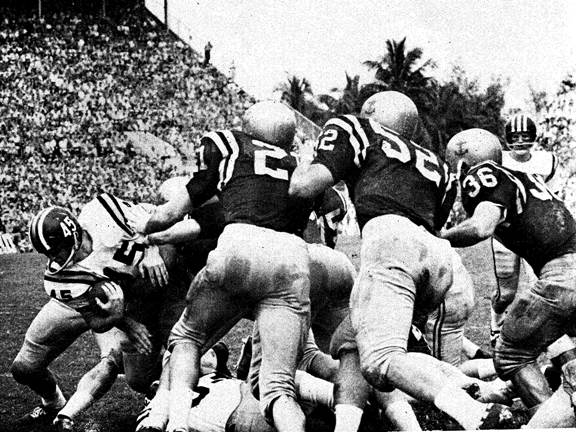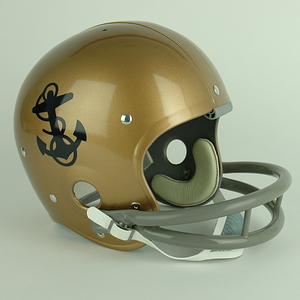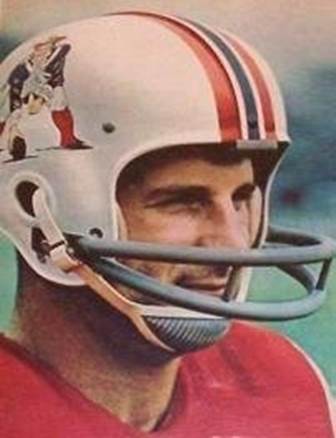

TRULY GREAT JOE BELLINO
HELMET HUT NEWS/REFLECTIONS January 2015:
TRULY GREAT JOE BELLINO
By Dr. Ken
It is the natural progression of
things but as we become older,
what was important or judged to
have met the standard of
greatness means little to a
younger, current generation. As
a self-described football geek
from an early age, I often knew
the names and statistics of
those otherwise forgotten idols
of my father’s youth, but had no
appreciation of the value they
brought to the game. His heroes
of the 1930’s and early ‘40’s
were names and numbers to me but
for him, the memories still had
power and meaning. Like any
young person, I just didn’t “get
it” when he spoke about Mel Hein
or Tuffy Leemans, but I
certainly get it now. The HELMET
HUT readers
who lived through the suspension
helmet era, perhaps played high
school or college football
before the so-called modern game
took over television, or more
accurately stated, television
took over the game. The players
that provided motivation to
them, and both inspired and
entertained are very much
forgotten. Even those who
ultimately were considered among
their personal collection of
“greats,” have been forgotten or
ignored by the present day
followers and analysts of
football. When most of the
television “talking heads”
consider football history as
beginning in the late 1970’s or
early ‘80’s, few true stars of
the 1950’s or ‘60’s will be
given their due. As one Sirius
Radio broadcaster told me, he
mentioned Johnny Unitas to a
current NFL player during an
interview and received a blank
stare in return, a total lack of
recognition of the great
quarterback until something
along the lines of “oh yeah, I
think I heard that name before”
spilled out.
It’s against this background that men like Joe Bellino remain almost unknown to any football fans and an afterthought to many now over the age of sixty. Yet, like his contemporaries Billy Cannon, Pete Dawkins, and Ernie Davis, he also remains as one of the best players of his time and one that should not be forgotten. In an era where gaining 1000 yards truly meant something and playing team oriented football was the standard, Bellino stood out. Playing in a United States Naval Academy offense that was not specifically geared to feature his talents or boost his statistics, he earned his All American status and Heisman and Maxwell Trophies. Without many of the physical characteristics that make for outstanding football accomplishments, Joe Bellino represented the culmination of dedication and hard work. Unfortunately many of these qualities have, like Bellino himself,been lost to time. Bellino was in many ways typical of his generation while also becoming atypically outstanding. He was clean cut, well spoken, had qualities of leadership, and allowed his on-the-field accomplishments to speak for him. Compared to the brash, self-aggrandizement that characterizes the modern collegiate or professional player, he is in retrospect, a reflection of an era lost but perhaps in need of more appreciation. During a time when representing one of the military academies was in fact an honor and privilege, Bellino captured the ultimate award given to a college football player.
Prior to the Vietnam conflict,
one that began in 1957 relative
to the involvement of the United
States and intensified to
prominent national news by 1964,
young men viewed entry to the
military academies as an elite
conquest. Being able to
represent one’s class in a
varsity sport was even more
prestigious. Thus both Army and
Navy attracted many football
players who were of true “he
could have gone anywhere to
play” caliber. Both academies
had a history of fielding teams
that were nationally competitive
[see HELMET
HUT http://www.helmethut.com/College/Navy/MDUSNA6060A.html ]
and Bellino was a natural for
the Naval Academy. He was
already the all American boy at
Winchester, Massachusetts High
School, a swimming and diving
stand out, a three sport star
who led his basketball team to
fifty-five consecutive victories
(and All State recognition for
himself) and two state
championships. His All State
baseball prowess as a catcher
earned an offer from the
Pittsburgh Pirates but he chose
to pursue football despite
standing but 5’9”. With most of
his muscular weight centered in
his thighs and monstrous calves
that later drew national
attention, Bellino first
elevated his grades and tempered
his football abilities at the
Columbian Academy in Georgetown
before entering the Naval
Academy in 1957. When Columbian
played the Navy plebe team,
their coaches received a preview
of what was coming as Bellino
scored three touchdowns in
leading his squad to a 34-33
victory over the Annapolis crew.
At the Naval Academy, Bellino
continued to improve, and
continued to play baseball well
enough that he was enticed by an
offer from the Cincinnati Reds
to leave Annapolis for the Major
Leagues. Instead, the Academy
provided him with custom-made
football pants to encase his
thighs and calves, and he
propelled his 185 pounds up and
down the football field to
national recognition. Again
placing his accomplishments
within the framework of the era
in which he played, his strength
and superior quickness allowed
him to move his rushing total
from 266 yards as a sophomore to
834 as a senior. This may pale
by modern standards where even
the worst offensive teams put up
thirty-plus points per game but
he averaged 5.7 yards per carry
his junior year and 5.0 in his
final season where his rushing
total placed him sixth in the
nation. He culminated the
regular season, though not his
collegiate career, with a
victory over Army, the Maxwell
and Heisman awards and helped to
lead Navy to a 9-1 season and a
number four national ranking.
Bellino’s final game was the
January 2, 1961 Orange Bowl
contest against the fifth ranked
Missouri Tigers.
 |
It was with rapt attention
that I sat in front of our
small black and white
television watching Bellino
face off against a Missouri
team that I had read about
in every magazine and
newspaper article I could
locate. Ranked in the top
ten most of the season and
at the number one spot
entering their finale
against arch rival Kansas,
there was plenty of news
prior to that game as the
NCAA and Big Eight
Conference investigated the
eligibility of Jayhawk
halfback Bert Coan. A
phenomenal high school
player out of Pasadena,
Texas, the swift, strong
6’4”, 220 pounder with close
to Olympian sprinter’s speed
had transferred from TCU to
Kansas after his freshman
season with cries of
“illegal inducement” from
Missouri and the rest of the
conference. With Kansas
alumnus Kenneth “Bud” Adams,
the future owner of the
American Football League’s
Houston Oilers as the
provider of the alleged
perks, there was much in the
way of “back and forth”
prior to the Border War that
already marked the animosity
between the Missouri and
Kansas programs. The 23-7
loss to Kansas knocked
Mizzou from the top spot in
the polls, although the game
was later awarded by forfeit
to the Tigers. With their
own offense and defense
highly respected, Missouri
had the tools to present the
Naval Academy with all they
could handle, and they did
just that. I had high
expectations for Bellino but
also knew that the Missouri
power sweep featuring speedy
Mel West was the equal of
anything Navy could put onto
the field [see
HELMET HUT
http://www.helmethut.com/College/Missouri/MOXXMU5760.html
]. I was rooting hard for
Bellino but was just as
enamored with the Tigers’
Danny LaRose and what was
considered to be the
original “Student Body
Right” and “Student Body
Left” rushing attack. Noting
that the Midshipmen wore the
navy blue anchor logo on
their gleaming gold helmets
when they took the field,
the same adornment that was
worn during their victory
over Army, added to my
excitement for the game.
 |
The 21-14 Missouri victory was
punctuated by the shut-down of
Bellino’s rushing as LaRose and
company held him to but four
yards. Bellino however did make
the play of the game, a fourth
quarter, twenty-seven yard
reception that Mizzou head coach
Dan Devine described as “the
greatest catch I’ve ever seen.”
The culmination of Bellino’s
collegiate career was entry to
the College Football Hall Of
Fame.
 |
Bellino was drafted by both the AFL and NFL in the latter rounds due to his military commitment. In 1963 he found time to play halfback for the Atlantic Coast Football League’s Providence Steamrollers and later was a member of the Boston Patriots from 1965 through 1967. The modest, unassuming Bellino retired with the rank of Captain after a total of twenty-eight years in the Navy and Naval Reserve. The collegiate player that ran like “a berserk butterfly” as famously described in one Sports Illustrated article, like every other academy graduate of his era other than Roger Staubach, could not enjoy the same level of professional success due to his military commitment, one that took him to Vietnam. Having to “settle” for having a local park in his hometown named in his honor, Joe Bellino, like so many forgotten stars, represented the football and character ideals of his generation, ideals that should not be forgotten.
 |